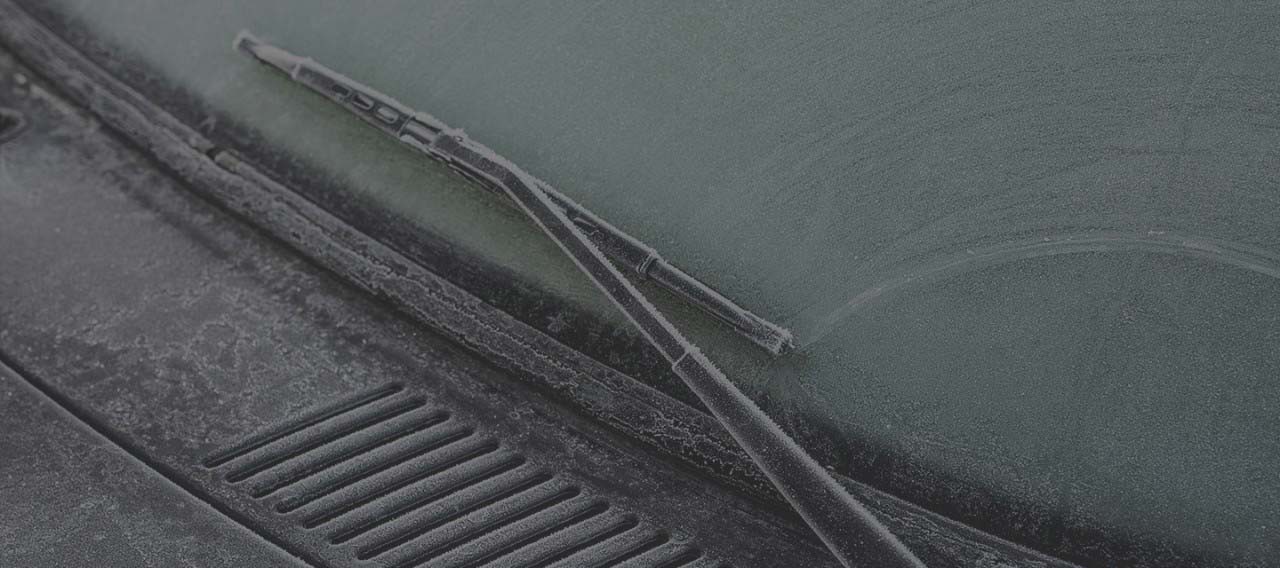Winter and your wiper blades
Ensuring that you have a clear view of the road, your windshield wipers work hard throughout winter to wipe away snow and ice. Keeping your wiper blades free of snow and ice buildup is paramount to them remaining in proper working order.
You may feel like you are at the mercy of Old Man Winter, but there are things you can do to ensure that your windshield wipers make it through the harsh winter season. Read on for simple tips that are easy to implement.
Preventative measures

PULL YOUR WIPER BLADES UP AND AWAY
When wintry weather is in the forecast and you don’t have the luxury of a garage, pull your wiper blades away from the windshield when you park your vehicle for the evening. This helps prevent ice from building up on the blades and also prevents the blades from sticking to the windshield.
Please note that this tip isn’t without controversy. There are many who endorse doing this while others argue against the practice, citing wear to the springs in the wiper arm. Decide for yourself which camp you’re in - blades up or blades down.
TURN YOUR WIPERS OFF
If you have been using your windshield wipers, be sure to turn them off when you park your vehicle. That way when you start up your car again, the wipers won’t automatically start going which can potentially tear the wipers if they become stuck to the windshield by snow and ice.
COVER THEM UP
Another way to protect your wiper blades is to cover them with old tube socks. This protects them against all sorts of winter weather – snow, ice, freezing rain.
PREVENT FREEZING WIPER BLADES
Prevent the problem in the first place! Keep your wiper blades from freezing to the windshield by wiping the blades with rubbing alcohol.
Upkeep and maintenance

BREAK OUT THE ICE SCRAPER
Don’t use your windshield wipers to remove ice, snow or frost from your windshield. Use an ice scraper or run your vehicle’s defroster to melt the layer of snow and ice. Using your wipers to clean the windshield can cause tears in your wiper blades.
When scraping your windshield, be careful when working around the wiper blades if they are down. If you scrape too aggressively, you risk gouging or tearing the wiper blade with the ice scraper.
KEEP NOZZLES CLEAR
Keep your windshield washer fluid nozzles clear of ice and snow. If the nozzles become frozen, they won’t be able to deliver wiper fluid when you need it. If the nozzles become clogged, you can use a pin to clear them.
CLEAN YOUR WINDSHIELD
Keep your windshield clear of dirt and debris. Running your wipers across a windshield covered in dirt and grime will shorten their lifespan. Make it a habit to clean your windshield whenever you fill up your vehicle with gas.
REMOVE SALT AND SAND
We all know that road salt can corrode your car’s body but did you know that salt can also damage your wiper blades? Salt can scratch and dry out your wipers which can lead to gaps and cracks developing. Once a week, wipe your blades with a wet cloth moistened with warm water to remove any salt or sand.
Final note
Even if you incorporate all of these tips into your daily car care routine, you still may see the effects of winter weather on your wiper blades. If you find yourself with damaged windshield wiper blades, don’t hesitate in replacing them. Wiper blades that are ripped, torn or split won’t deliver a clear, consistent wipe. Don’t gamble with your safety or the safety of your passengers – always drive with windshield wipers and rear wipers that are in top operating condition.

 Canada
Canada  Canada | Français
Canada | Français  United States
United States
